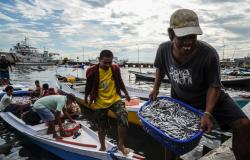Interlinkages of Culture and Government Policy in Tackling Global Challenges: A story from Indonesian fisheries

Indonesia, an archipelago in Southeast Asia, is situated strategically between the Indian and Pacific Ocean and made up of more than 17,000 islands. Fisheries become one of the Indonesians’ main occupations. The country’s local media, Tirto, reported that Indonesia was the second largest producer of the world’s marine fisheries after China in 2014. Last report from FAO stated that Indonesia is included as one of the world’s biggest shrimp export suppliers – along with China, Vietnam, India and Ecuador.
However, recent research has found a lack of sustainable implementation in the Indonesian fisheries sector. The question of sustainable fishing in Indonesia and other parts of the world includes challenges that are economic, political, technical and cultural.
Indonesian fisheries’ products are desired by both the local and international market. Ensuring the steady supply of the demand therefore becomes the major focus. It is known that most Indonesian fishermen use small fishing boats with relatively low-level technology for their daily, small-scale fisheries operation. Most of them operate near the coastline which leads to overfishing and the decrease of fish stocks in coastal areas.
This becomes a problem for the local fishers. Although most of them admit that overfishing would impact fish stocks and put sustainable livelihoods at risk, economic pressure is primarily why this practice continues. As international concern regarding the source of fishery products is on the rise, the challenge for the Indonesian government is to ensure that their seafood products are sustainable, and come from responsible fishing practices in order to be accepted by international standards.
Tradition vs Regulation
It is crucial to focus on the cultural aspect of Indonesian fishing practices to create sustainable development. Approach and empowerment to the local fishers’ communities are needed, because fishing practices are coupled with social and cultural traditions.
The boat designs, for instance, are highly related to the region’s culture. Wood often becomes the main vessel material. The engine is obtained from secondhand truck engines or other non-marine diesel engines, and there is a lack of electronic devices to assist fishing operations. This is because most local fishers prefer to use natural signs for navigation. Implementation of health and safety requirements is also relatively poor, as there is no proper shelter in the boat. Local fishermen also often use cantrang – i.e. a local fishing instrument similar to the Danish seine net – which is not environmentally friendly as it could also ‘catch’ small, underdeveloped fish and ruin the corals.
Role of MMAF
The Indonesian Ministry of Marine Affair and Fisheries (MMAF) has a huge role in solving these problems. Its current leader, Minister Susi Pudjiastuti, banned the use of cantrang in late 2017 in order to promote sustainable fishery habits among small-scale fishermen.
Outraged sparked from the local fishermen regarding this issue as it could reduce their income, but the decision passed in the last few years through Ministerial Regulation No.1/2015. With roughly two years of transitional period, President Joko Widodo decided that starting this year, more environmentally friendly fishing equipment should be used.
This becomes another problem for local fishers as they need capital to change their operation procedure. The role of the government is once again needed to provide the solution. As a consequence, government assisted local Indonesian fishers with bank loans to purchase new sustainable fishing equipment. Training and adaptation using the new equipment will also be provided, according to Indonesia’s Central Java governor.
Interlinkages of Culture and Government Policy
The implementation of the ‘new’ fishing regulation may have started with some reluctance, nevertheless, the Indonesian government’s persistence in tackling the challenge for making fisheries sustainable is a step forward. Using Indonesian fisheries as a case study, it is clear that understanding the local culture and situation is important in tackling global challenges, especially in relation to responsible consumption and production (Goal 12) and life below water (Goal 14).
Universities and particularly academia have a key role in supporting the implementation of the SDGs, especially in understanding interlinkages between the goals and obtaining evidence for tracking progress towards them. International Institute for Sustainable Development (IISD) and United Nations also agree that research helps to provide the basis for new approaches and sustainable solutions, whilst highlighting the key of the SDGs during the discussions and implementation process.
Universities need to commit to tackling global challenges through research and partnerships with global networks, many of which are highlighted by the SDGs such as clean water and sanitation (Goal 6), zero hunger (Goal 1), sustainable livelihoods (Goal 8) and health (Goal 3). Collectively, we stand to make a major impact that could set the precedent for future sustainable development frameworks.
This work is part of the Global Challenges Academy research networks at Newcastle University. Join the conversation on Twitter using hashtag #NCLGlobalChallenges. It was reposted with permission from the Institute of Sustainability.


